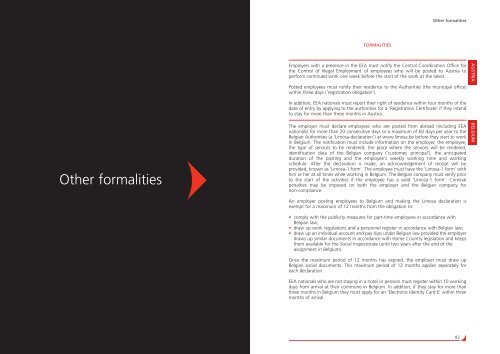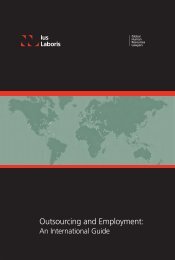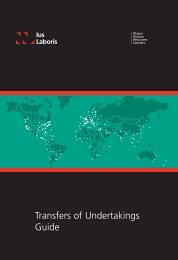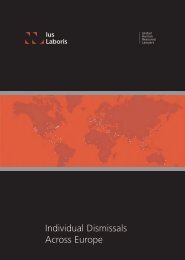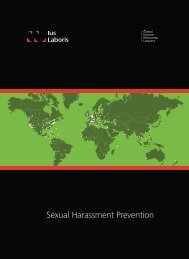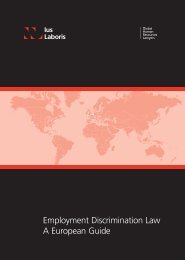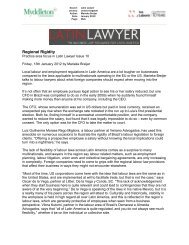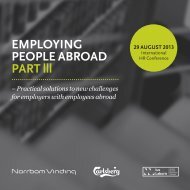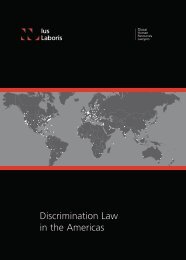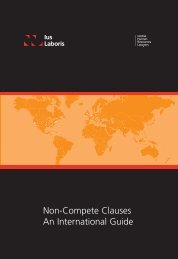Secondments to and within Europe - Ius Laboris
Secondments to and within Europe - Ius Laboris
Secondments to and within Europe - Ius Laboris
Create successful ePaper yourself
Turn your PDF publications into a flip-book with our unique Google optimized e-Paper software.
Other formalities<br />
FORMALITIES<br />
Employers with a presence in the EEA must notify the Central Coordination Office for<br />
the Control of Illegal Employment of employees who will be posted <strong>to</strong> Austria <strong>to</strong><br />
perform continued work one week before the start of the work at the latest.<br />
Posted employees must notify their residence <strong>to</strong> the Authorities (the municipal office)<br />
<strong>within</strong> three days (‘registration obligation’).<br />
AUSTRIA<br />
In addition, EEA nationals must report their right of residence <strong>within</strong> four months of the<br />
date of entry by applying <strong>to</strong> the authorities for a ‘Registration Certificate’ if they intend<br />
<strong>to</strong> stay for more than three months in Austria.<br />
Other formalities<br />
The employer must declare employees who are posted from abroad (including EEA<br />
nationals) for more than 20 consecutive days or a maximum of 60 days per year <strong>to</strong> the<br />
Belgian Authorities (a ‘Limosa-declaration’) at www.limosa.be before they start <strong>to</strong> work<br />
in Belgium. The notification must include information on the employer, the employee,<br />
the type of services <strong>to</strong> be rendered, the place where the services will be rendered,<br />
identification data of the Belgian company (‘cus<strong>to</strong>mer, principal’), the anticipated<br />
duration of the posting <strong>and</strong> the employee's weekly working time <strong>and</strong> working<br />
schedule. After the declaration is made, an acknowledgement of receipt will be<br />
provided, known as ‘Limosa-1 form’. The employee must have the ‘Limosa-1 form’ with<br />
him or her at all times while working in Belgium. The Belgian company must verify prior<br />
<strong>to</strong> the start of the activities if the employee has a valid ‘Limosa-1 form’. Criminal<br />
penalties may be imposed on both the employer <strong>and</strong> the Belgian company for<br />
non-compliance.<br />
BELGIUM<br />
An employer posting employees <strong>to</strong> Belgium <strong>and</strong> making the Limosa declaration is<br />
exempt for a maximum of 12 months from the obligation <strong>to</strong>:<br />
• comply with the publicity measures for part-time employees in accordance with<br />
Belgian law;<br />
• draw up work regulations <strong>and</strong> a personnel register in accordance with Belgian law;<br />
• draw up an individual account <strong>and</strong> pay slips under Belgian law provided the employer<br />
draws up similar documents in accordance with Home Country legislation <strong>and</strong> keeps<br />
them available for the Social Inspec<strong>to</strong>rate (until two years after the end of the<br />
assignment in Belgium).<br />
Once the maximum period of 12 months has expired, the employer must draw up<br />
Belgian social documents. This maximum period of 12 months applies separately for<br />
each declaration.<br />
EEA nationals who are not staying in a hotel or pension must register <strong>within</strong> 10 working<br />
days from arrival at their commune in Belgium. In addition, if they stay for more than<br />
three months in Belgium they must apply for an ‘Electronic Identity Card E’ <strong>within</strong> three<br />
months of arrival.<br />
83


